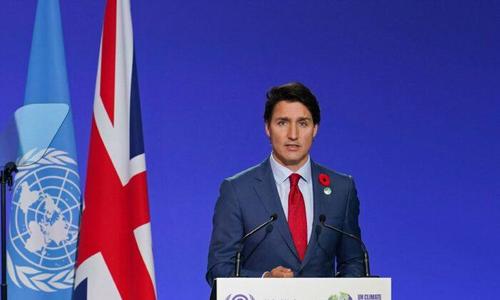COP26: Trudeau's Heightened Climate Demands On Oil & Gas Sparks Criticism Back Home
Authored by Rahul Vaidyanath via The Epoch Times,
In the lead-up to COP26, the G20 was not as downbeat on oil and gas as it could have been, but Canada’s Prime Minister Justin Trudeau stood apart by ramping up talk on fighting emissions. Back home, however, his words caused some consternation for the industry that is already working toward net-zero 2050. The leader’s pledges also appear to have had no effect on some of the world’s biggest polluters.
The G20, which met in Rome on Oct. 30–31, did not commit to achieving net zero by 2050. The time frame proposed was “by or around mid-century.” Carbon-intensive countries like China, Russia, and Saudi Arabia have indicated they would aim to achieve carbon neutrality by 2060. China and Russia were not in attendance at COP26.
The G20 did not take further action to phase out fossil fuel subsidies.
Amid an energy crisis and surge in inflation, the current demand for oil and natural gas is unmistakable. U.S. President Joe Biden had previously urged the Organization of the Petroleum Exporting Countries (OPEC) to increase production. In the push toward net-zero 2050, the International Energy Agency forecasted OPEC’s share of a much smaller global supply of oil to expand.
But Trudeau increased the pressure on Canada’s energy sector with talk of a hard cap.
“Today, Canada moves to cap oil and gas sector emissions and ensure they decline at a pace and scale needed to achieve net-zero by 2050,” Trudeau tweeted on Nov. 1 at COP26, which runs from Oct. 31 to Nov. 12 in Glasgow, Scotland. The United Nations COP (Conference of the Parties) is the world’s highest-profile climate conference, since the Paris Agreement—a legally binding international treaty on climate change—was reached at COP21 in 2015.
Alberta’s environment and parks minister Jason Nixon told BNN Bloomberg that the feds haven’t invested nearly enough to achieve their emission reduction goals.
“The prime minister seems to go on a regular basis and set targets but doesn’t really invest to make sure those targets will come forward,” he said.
“Their investment does not meet their ambition.”
China is the world’s top carbon emitter, producing 28 percent of global greenhouse gas (GHG) emissions, with 60 percent of its electricity coming from coal. But it is not making additional efforts to cut back on emissions. Meanwhile, Canada is responsible for less than 2 percent of GHG globally.
G20 leaders “took only baby steps” on environmental issues, said John Kirton, director of the G20 Research Group at the University of Toronto, in his Oct. 31 analysis of the Rome summit.
He noted that the G20 did “very little else” other than giving serious attention to natural carbon sinks and detailing emission sources.
Big Questions Remain
The feds issued a statement on Nov. 1 saying that “Canada is the first major oil-producing country moving to capping and reducing pollution from the oil and gas sector to net zero by 2050.”
The Canadian government will set five-year national emission reduction targets—as mandated by Bill C-12, passed in June—and also “ensure that the sector makes a meaningful contribution to meeting Canada’s 2030 climate goals.” The feds will seek the advice of the Net-Zero Advisory Body on how to best move forward on this approach.
Conservative MP Pierre Poilievre, shadow minister for jobs and industry, tweeted, “Will Trudeau’s cap on oil & gas apply to the dirty dictatorships from which we import or just to Made-in-Canada energy? Asking for several hundred thousand workers.”
To transition to a lower-carbon economy, many questions remain unanswered in Canada and globally relating to investment, carbon pricing, and employment. The expectation—and for some, hope—is that COP26 will tackle the fine print as environmental groups argue not enough is being done quickly while society’s energy demands grow and the livelihoods of thousands hang in the balance.
“It will be incredibly important for the federal government and the natural gas and oil industry to work collaboratively to ensure we meet our environmental and social outcomes. To achieve the ambitions of the Paris Agreement the world will need increased access to lower emission natural gas and oil,” said Tim McMillan, president & CEO of the Canadian Association of Petroleum Producers (CAPP), in a statement.
“Canada, under the right policy environment, can position ourselves as a preferred global supplier, creating jobs and prosperity for Canadians and helping to lower global greenhouse gas emissions,” McMillan said.
Alberta on Nov. 1 announced an investment of $176 million to reduce GHG emissions through 16 clean-energy projects. The initiatives are expected to cut about 7 million tonnes of emissions annually by 2030.
https://ift.tt/3nUb4zG
from ZeroHedge News https://ift.tt/3nUb4zG
via IFTTT


0 comments
Post a Comment